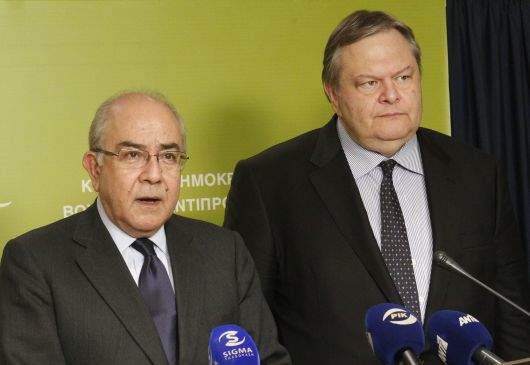 Y. OMIROU: It is with great pleasure and affection that we welcomed to the House of Representatives the Deputy Prime Minister and Foreign Minister of Greece, our dear friend Evangelos Venizelos.
Y. OMIROU: It is with great pleasure and affection that we welcomed to the House of Representatives the Deputy Prime Minister and Foreign Minister of Greece, our dear friend Evangelos Venizelos.
I want to stress with emphasis that the messages being sent by these meetings are messages of courage, resolve, for the protection of the national rights of Hellenism as a whole, because in the conditions of the economic crisis that Cyprus and Greece are in the midst of, it should cross no one’s mind, no third party’s mind, that we will back down on the defence of our national rights.
Greece – they say it and we repeat it, and it is the reality that life itself has shown in practice – is the natural and selfless ally and supporter of Cypriot Hellenism. Thus it remains today and in the days to come.
And the national unity of spirit between Cypriot and Greek Hellenism is a term and condition for our achieving the goal of a democratic, just, viable, functional solution of the Cyprus problem, based on the Cyprus-related resolutions of the Security Council, the high-level agreements, and of course the regulations of European Justice and European legal culture, given that Cyprus is a member state of the European Union.
We have discussed with our friend the Foreign Minister and Deputy Prime Minister of Greece the prospects with regard to the Cyprus issue. We are in complete agreement that the message must be sent that 39 years is a very, very long time, a torturously long time, and that the international and, in particular, the European community must appeal to Turkey to change its line and reconcile itself with the idea of a solution for the Cyprus issue; a solution that will shape conditions of security, stability and cooperation in the wider region, which is plagued by many problems and by conditions of instability.
We will continue our close and brotherly cooperation, and I am sure that, together, we will open up new prospects and hope for the future, for all of Hellenism.
E. VENIZELOS: I fully endorse everything said by the President of the House of Representatives, my dear friend Yiannakis Omirou. As you know, we are linked by a friendship of many years. We share the same values and outlooks, and we express the same concerns. The economic crisis steels us. Our peoples are suffering sacrifices and affronts. But peoples suffering sacrifices and affronts in the field of the economy cannot accept pressures in the field of foreign policy and the defence of national sovereign rights.
We exchanged experiences regarding the management not just of the Greek and Cypriot crises, but of the pan-European crisis, because the key objective is for the pace and orientation of European integration to change.
We have to re-politicize Europe, make major and bold institutional changes and ensure the institutional equality of the member states. Because the crisis has shown that there are dangerous inequalities within the European Union and the Eurozone, and the crisis is propagating and amplifying these inequalities.
During our talks, we both noted the great importance of the developments in the energy sector, and the President of the House of Representatives was kind enough to brief me on everything he concluded from his trip to Moscow, from which he returned a short time ago, having headed a large Cypriot parliamentary delegation.
It is of great importance that we correctly assess the developments in the wider region: the recent developments in Egypt, everything happening in Syria, what is happening in Iran, how regional interrelations are being shaped. Because this directly impacts our national strategy and, naturally, our shared perceptions regarding the major pending issues.
We agreed that a new moment must be shaped, a new momentum for the Cyprus issue, always within the framework that we stressed and that Mr. Omirou set out for you – the framework of the UN resolutions, Community Law, the European legal and institutional culture.
Because we need to have the initiative of actions, and because the international community must not forget that there is an open wound here. An open wound on the body of the European Union and on the body of the Eurozone, which is not just a monetary zone – it is also an institutional entity within Europe.
I was very glad to have this opportunity to talk with Yiannakis Omirou, and our discussion will continue as soon as possible, whether in Athens or Nicosia. Thank you very much.
July 5, 2013


